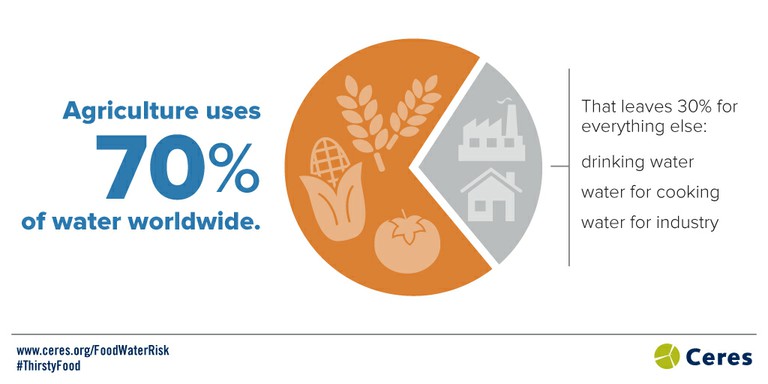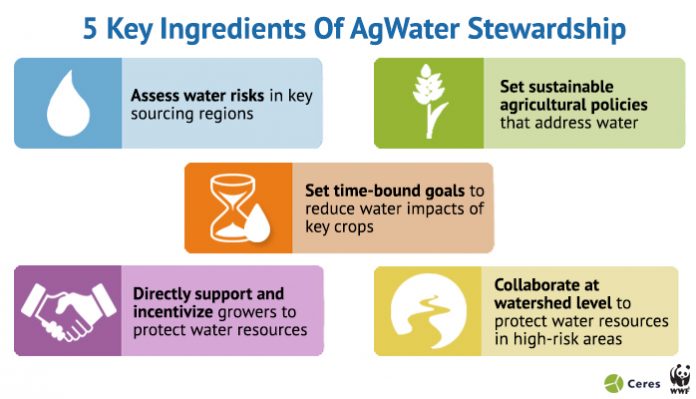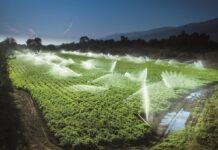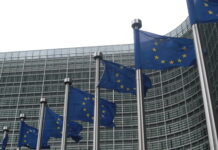As climate change, population growth and water pollution increase pressure on freshwater resources, seven global food and beverage companies have announced commitments to work with thousands of growers in their global supply chains to reduce water use and pollution impacts.
The seven companies–Diageo, General Mills, Hain Celestial, Hormel Foods, Kellogg, PepsiCo, and WhiteWave Foods–are participants in the AgWater Challenge, a collaborative initiative organised by Ceres and World Wildlife Fund (WWF). Participants submitted detailed sustainable sourcing and water stewardship plans, and the companies that met specific criteria were recognised by the WWF and Ceres as AgWater Stewards.
“Major food brands can be a powerful and constructive force for scaling water stewardship, especially at the farm level where the biggest footprint is by far,” said Brooke Barton, Senior Director of the Water and Food Program at Ceres, a nonprofit sustainability group. “These brands recognise the material financial impact that water risks pose to their business, from supply disruptions, to higher operating costs, to growth constraints. More than ever, companies are responding to these supply risks through farmer incentives, local partnerships and bottom line reductions.”
One-third of the world’s food is grown in areas of high water stress or competition, and agriculture is a leading cause of water pollution worldwide. The food sector, which uses 70 percent of global freshwater supplies, primarily for growing crops, can play a critical role in protecting limited freshwater resources by working with farmers to become more water smart.
“Mismanagement of our increasingly stressed freshwater resources presents a serious risk to life on Earth—wildlife and humans,” said Lindsay Bass, Manager of Corporate Water Stewardship, WWF. “The purpose of the Challenge is to encourage these companies to understand and address agricultural water risks, and share the knowledge picked up along the way. We all have a mutual interest in protecting the world’s most stressed water resources.”

The AgWater Challenge aims to spur companies to make time-bound and measurable commitments to reduce the water impacts associated with key agricultural commodities, implement locally-relevant strategies to mitigate risk in agricultural areas where water is scarce or polluted, and support and incentivise farmers to strengthen water stewardship practices.
WWF and Ceres employed criteria to evaluate companies’ water management plans. To be named an AgWater Steward, companies had to complete minimal criteria, including setting a time-bound goal for completing a water risk assessment across their supply chains and setting sustainable sourcing goals. While all companies went beyond the minimum criteria, the AgWater Challenge recognises that all companies’ efforts are a work in progress.
“Expanding our water goals to include PepsiCo’s agricultural supply chain is a key part of our Positive Water Impact strategy, designed to enable long-term sustainable water security for our food and beverage business and others who depend on water availability,” said Roberta Barbieri, Vice President, Global Environmental and Water Solutions, PepsiCo.
In addition to new commitments, the AgWater Challenge recognises companies with far-reaching, ongoing commitments. Diageo, General Mills, and Kellogg were recognised as AgWater Stewards for showing action across all five categories of the groups’ AgWater Challenge checklist–from water risk assessments and setting reduction goals, to reducing water risk in agricultural supply chains and supporting producers in addressing these issues.
“The footprint of our extended value chain goes well beyond our offices and facilities,” said Jerry Lynch, Chief Sustainability Officer at General Mills. “A very large portion of that footprint is in agriculture. The challenges facing our company and our planet are more pressing than ever, so we have to build resiliency in our supply chains to ensure that we can continue to serve the world by making food people love.”
In 2017, Ceres will evaluate the companies’ adherence to their commitments through the release its second Feeding Ourselves Thirsty report, which benchmarks global food and beverage companies on their water management practices. All of the AgWater Stewards will be benchmarked in the report, along with several dozen additional companies.








